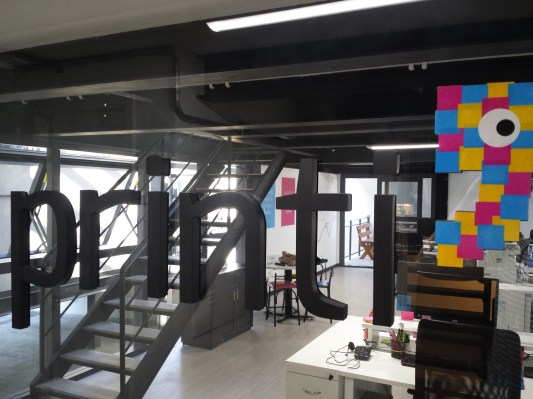Global printing heavyweight Vistaprint has acquired a $25 million minority stake in Brazilian web-printing startup Printi. The purchase marks Vistaprint’s entry into Latin America, after assuming market leadership in the U.S., Europe and Asia.
Vistaprint bought out all of Printi’s investors’ stake and a portion of the founders’ stake in the company, but the founders still maintain a majority stake of the company and control the board. “They wanted to acquire us 100 percent but we wanted to make it closer to what a VC deal would look like,” said co-founder and co-CEO Mate Pencz tells me on a call from Recife. “We’re staying on board and staying completely independent.”
Vistaprint’s CEO Robert Kearne and VP of Portfolio Management Jeremie Profeta will join Pencz and his co-founder and co-CEO Florian Hagenbuch on the board. “Our investment is an important strategic step and we look forward to growing aggressively in Brazil,” said Profeta.
The investment comes at precisely the time Printi is outgrowing its model of outsourcing fulfillment to large printing factories, and the founders decided to vertically integrate production and construct their own printing factory in São Paulo.
“We had VC term sheets, but it came down to the fact that our business is a little unusual as a tech company,” says Pencz. “We have a large manufacturing component, and in a lot of the VC conversations we were having, they did not understand the factory component. We admire the manufacturing expertise Robert has developed at Vistaprint and thought this could be a valuable asset to us once Printi reaches a certain scale.”
Printi made $3 million in revenue for 2013, and is on track to exceed $10 million this year, fulfilling about 6,000 orders per month. A source close to the company estimates gross margins at 40 percent. Pencz says business has grown gradually, with the help of high repurchase rates from loyal customers, and has been operating at more or less break-even since last year.
Printi’s only prior outside investment (Pencz and Hagenbuch put in about $50,000 of their own money to build the first website) was a $1.2 million Series A round with participation from Greenoaks Capital, Palantir co-founder Joe Lonsdale, serial Brazilian entrepreneur Fabrice Grinda and Groupon Brazil co-founder Florian Otto.

Mate Penzc (l) and Florian Hagenbuch
The $25 million investment capital from Vistaprint will fund the construction of their primary fulfillment factory in São Paulo and also go towards B2B marketing with a mix of digital advertising, direct mail, radio and sponsorships, as well as to scale production. They are also beginning to experiment with individual packaging solutions, like batches of private-label, customized boxes. “Over the next couple of years we have plans to expand to the rest of Latin America,” Pencz says. “And now we are Vistaprint’s exclusive partner for the region.”
How did Pencz and co-founder Hagenbuch, London finance executives who met as summer interns at Goldman Sachs in 2008, decide to attack the B2B printing industry in Brazil?
“It was opportunistic,” says Pencz. “Florian grew up in Brazil, and his father worked in the printing industry on the manufacturing side for Heidelberg Druck in Europe. What I found appealing is that it’s a niche market [$15 billion by Pencz’s estimate] but big enough to build a big business.”
At a time of otherwise accelerated foreign interest in flashy viral-growth startups like Peixe Urbano, Groupon and Vostu in Brazil, Pencz says he felt uncomfortable going into something that felt too hot. “We just didn’t see the fundamental demand for these models down here. So we said, what’s the least sexy thing we can do in the least sexy, most backward-looking, anti-innovation market we can find?”
When Printi launched in 2012, Pencz called Brazil’s printing industry “extremely corrupt,” and claimed it was “stuck in the 1980’s.” He says it hasn’t fundamentally changed in the two years since. “All of the same descriptions still apply.”
Consumers with print needs are relegated to the neighborhood selection of mom-and-pop printers. Printing a single black-and-white page at one such store in Ipanema Beach will run you close to $0.50. “In B2B you also have a pricing issue and a transparency issue,” explains Pencz. “You can’t really call up the big printing company if you’re a small or medium-size business and get price quotes directly. If you’re Coca-Cola, then you can have a direct relationship to the printing company and decent pricing transparency, but not small/medium-size businesses. You have to go through a print broker. So you have middle-men managing client relationships and intermediating transactions and turning the process extremely manual.”
Pencz says that the throwback status of Brazil’s printing industry is reinforced by the fact that “printing in general in Brazil is still growing at decent rates, so some businesses are hurting, but not enough to try to innovate.” Printi is the only player in Brazil’s web-printing space, although Pencz says a number of companies operating offline storefronts have launched websites.
“But none of them have grown significantly because it’s an additional channel that competes with their main channel. So by definition, showing your prices online and being able to quote clashes with having hundreds of sales people running around and extracting highest price from your customers. It’s a massive channel conflict, and nobody is willing to sacrifice main sales channel to do volume online.”
Printi takes about 5-6 percent of its annual revenue from such offline companies like print franchises and coffee shops, says Pencz. A partnership in 2012 with offline print network AlphaGraphics was expected to bring in as much as $10 million in revenue per year, but Pencz says they encountered too many barriers to getting an offline partner to bring them orders at scale.
Printi currently services about 35,000 active customers in Brazil. While there are some big-name outliers like Santander, Netshoes, Baby.com.br and Intel, which send small or last-minute orders to Printi, Pencz says about 20,000-25,000 of their clients are small companies or independent professionals, and he doesn’t expect that to change.
“It’s extremely difficult to change the purchasing behavior of the big guys. They want to pay later, or pay on different terms, and the bigger the company, the more bureaucratic it gets. Our path to least resistance is to find more small and medium-size clients.”
Printi also has no foreseeable plans to expand to the B2C market — for example, Kinko’s services offline. “What matters to us is recurring volumes,” Pencz maintains. “You have to buy at least 100 of anything you order. And good customer service, he insists, is what drives a lot of the repurchase rate. “A lot of people call before or after they make a purchase. It’s a relatively complex product to sell online.” Of about 50 employees, six are dedicated to phone support.
“The traditional market is fraught with bad service and a lot of resistance to attend to customer need, so we decided to offer exactly the opposite,” says Pencz. “Even if the problem occurred on the side of the customer, say they misspelled something on their business card, often we’ll simply reprint it. It’s part of our company ethos. We thought it would lead to a lot of customer complaints and fraud, but that has not been the case at all. We have a 2-3 percent complaint rate, and we take care of it. For us it’s a customer acquisition tool, and one of our cheapest acquisition channels.”
Printi spends about 10-15 percent of its monthly revenue on marketing, including search campaigns targeting customers dissatisfied with offline print services.
With the new investment round, Printi is the most heavily funded of a growing crop of startups making solid progress in unsexy, service-facing businesses in Brazil, including insurance comparison site ComparaOnline, which disintermediates insurance brokers, and travel meta-search engine Voopter, which disintermediates travel brokers. Now we can add print brokers to the list of disintermediated parties.
“We’d be lying if we said we weren’t doing it for the money,” says Pencz. “We started Printi to make money, and did this round to make money, but the end goal is something bigger. We think the opportunity is very big, and we’d like to believe we’re helping transform an industry fraught with problems. On a day-to-day operational level, what drives me is seeing how small changes can lead to big improvements. How the flywheel starts spinning. Having tangible traction is super motivating.”
